Originally posted on October 28, 2023 @ 11:58 pm
Welcome to the world of Feng Shui and Zen, two ancient practices that aim to create balance and harmony in our daily lives. Although these practices may seem similar, they have distinct differences in principles and techniques. In this article, we will explore the differences and similarities between Feng Shui and Zen, and how they can enhance our lives.
Key Takeaways:
- Learn the differences between Feng Shui and Zen practices.
- Understand how Feng Shui principles guide the arrangement of objects and space to promote positive energy flow.
- Discover how the Zen philosophy emphasizes simplicity and mindfulness as a means to achieve inner peace and tranquility.
- Explore practical tips on how to apply Feng Shui principles in home decorating and enhancing relationships.
- Learn different techniques of Zen meditation and how they can benefit overall well-being.
Understanding Feng Shui Principles
In order to truly embrace the practice of Feng Shui, it’s important to understand the foundational principles that guide it. At its core, Feng Shui is based on the idea that our environment has a profound impact on our well-being.
“Feng Shui is not simply about changing the arrangement of things in your environment; it is about changing the energy that flows around you.”
One of the primary principles of Feng Shui is the concept of yin and yang, which are opposing energies that must be balanced to create harmony. For example, a room that is cluttered and chaotic may have an excess of yin energy, whereas a room that is sparse and lacking in vitality may have an excess of yang energy.
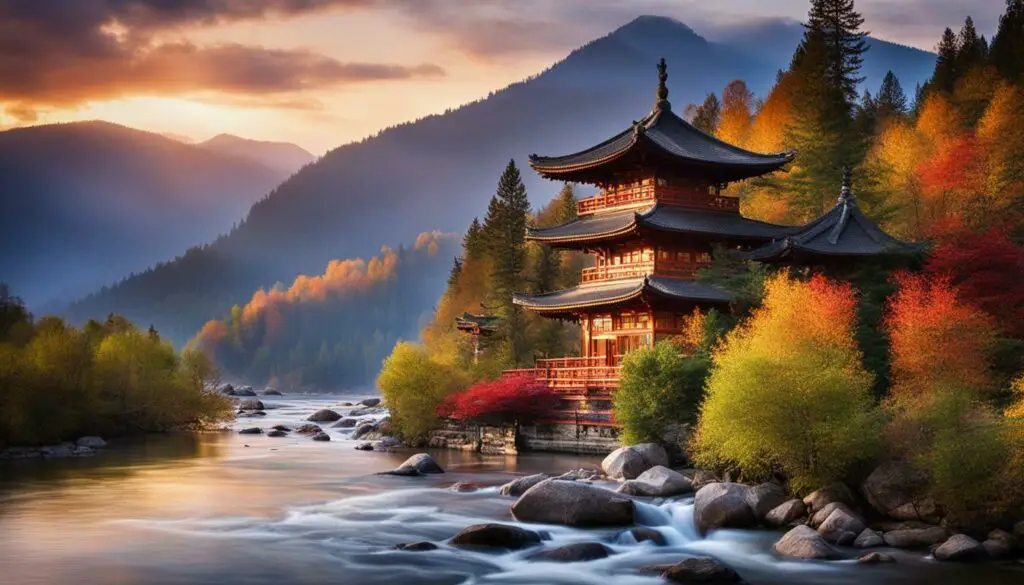
Another key principle of Feng Shui is the use of the bagua, which is a map that is used to identify the different areas of your space and align them with specific areas of your life. By utilizing the bagua, you can create a living space that is in harmony with your specific goals and desires.
When it comes to decorating with Feng Shui, it’s important to pay attention to the placement of objects, colors, and elements in your space. For example, certain colors are associated with specific areas of the bagua, and can be used to activate or enhance certain energies. Furniture should also be arranged in a way that promotes the flow of energy throughout the space.
How to Incorporate Feng Shui in Your Decorating
If you’re interested in incorporating Feng Shui principles into your home decor, there are a few key tips to keep in mind:
- Avoid clutter and maintain a clean, organized living space.
- Utilize natural light and incorporate lighting fixtures that are visually appealing and promote a positive atmosphere.
- Choose furniture and decor that is in alignment with your personal goals and desires.
- Incorporate colors that activate specific areas of the bagua and contribute to a harmonious atmosphere.
- Use mirrors strategically to reflect light and energy throughout the space.
By understanding and embracing the principles of Feng Shui, you can create a living space that is in alignment with your personal goals and desires, and promotes positive energy flow and harmony.
Embracing the Zen Philosophy
Zen philosophy is all about embracing a simple and mindful way of life. It encourages us to live in the present moment and cultivate a deeper awareness of our thoughts and actions. At its core, Zen philosophy is centered around the idea of inner peace and balance, which can be achieved through meditation, mindfulness, and living with intention.
One of the key tenets of the Zen philosophy is simplicity. This means letting go of unnecessary possessions, simplifying our daily routine, and decluttering our minds. By embracing a minimalist lifestyle, we can eliminate distractions and focus our energy on what truly matters. This can help us cultivate a deeper sense of inner peace and tranquility.
In addition to simplicity, Zen philosophy also emphasizes the importance of mindfulness. Mindfulness is the practice of being fully present in the moment, without judgment or distraction. It means paying close attention to our thoughts, feelings, and surroundings, and experiencing them without attachment or aversion.
Through mindfulness practice, we can develop a deeper understanding of ourselves and our environment. We can learn to observe our thoughts and emotions without judgment, and cultivate a greater sense of acceptance and compassion towards ourselves and others.
The Benefits of a Zen Lifestyle
There are many benefits to embracing a Zen lifestyle. By simplifying our lives and cultivating mindfulness, we can reduce stress and anxiety, improve our relationships, and enhance our overall well-being. Here are just a few of the benefits of a Zen lifestyle:
- Reduced stress and anxiety
- Improved mental clarity and focus
- Enhanced creativity and productivity
- Greater sense of peace and tranquility
- Better relationships with others
- Improved physical health
By incorporating the principles of Zen philosophy into our daily lives, we can experience profound transformation and live more fully in the present moment.

Feng Shui Decorating for Harmony
Implementing Feng Shui principles in your home decor can create a harmonious living environment. Here are some useful tips on how to incorporate Feng Shui decorating for harmony:
- Declutter: The first step to creating a harmonious space is to declutter. Remove any items that no longer serve a purpose and organize your space.
- Balance: Feng Shui emphasizes the importance of balance. Ensure that your furniture, colors, and elements are balanced throughout the space.
- Color: Colors have a significant impact on energy flow. Choose colors that promote tranquility and calmness such as blues, greens, and earthy tones.
- Elements: Incorporate the five elements (water, wood, fire, earth, and metal) in your decor to create a balanced and harmonious environment.
- Furniture arrangement: Arrange your furniture in a way that promotes social interaction and communication.
By following these tips, your space will become a sanctuary for positive energy and harmony.

Zen Meditation for Inner Balance
One of the core practices of the Zen philosophy is meditation. Zen meditation, also known as Zazen, is a technique that helps cultivate mindfulness, focus, and inner balance.
To practice Zen meditation, you need a quiet, uncluttered space where you can sit in a comfortable position. Ideally, your back should be straight, and your eyes should be partially open, gazing at a spot a few feet in front of you.
Breathing is crucial in Zen meditation. Focus on your breath and try to let go of any distracting thoughts or emotions that arise. If your thoughts start to wander, gently bring your attention back to your breath.
Many people find it helpful to use a mantra or a phrase to focus their mind during meditation. One popular mantra in Zen is “Mu” (pronounced “moo”), which means “no” or “nothingness.” Repeat this mantra silently to yourself, using it as an anchor to bring your focus back to the present moment.
Research has shown that regular meditation can have numerous health benefits, including reduced stress and anxiety, improved focus and concentration, and increased emotional well-being. Consider incorporating Zen meditation into your daily routine to promote greater inner balance and tranquility.

Balancing Energy with Feng Shui
Feng Shui is the ancient Chinese practice of arranging objects, colors, and elements in a space to promote positive energy flow and harmony. At the core of Feng Shui is the concept of chi, which is the life force energy that flows through everything in the universe.
The specific arrangement and placement of objects in a space can affect the flow of chi and contribute to a harmonious atmosphere. For example, cluttered spaces can interrupt the flow of energy and create a sense of chaos, while open and unobstructed spaces can promote a smooth flow of energy and a sense of calm.
| Object | Placement | Effect |
|---|---|---|
| Mirrors | Avoid placing them directly facing the bed | Prevents energy from bouncing back and forth and disrupts sleep |
| Plants | Place them in areas with stagnant energy | Revitalizes the space and promotes a sense of renewal and growth |
| Clocks | Avoid placing them facing the bed | Creates a sense of rush and stress, disrupting sleep |
By following the principles of Feng Shui, you can create a harmonious living space that promotes positive energy flow and balance.

To enhance the energy balance in your space, you can also incorporate the five elements of Feng Shui:
- Water
- Wood
- Fire
- Earth
- Metal
Each of these elements corresponds to a specific area of life and can be used to enhance or balance the energy flow in a space. For example, incorporating the water element in the north area of your home can enhance career opportunities, while incorporating the wood element in the east area can promote health and vitality.
Conclusion
By embracing the principles of Feng Shui and balancing the energy in your space, you can create a harmonious and balanced environment that promotes positive energy flow and overall well-being.
Cultivating Mindfulness Through Zen
The Zen philosophy emphasizes mindfulness as a means to achieve inner peace and tranquility in our daily lives. Here are some practical ways to incorporate mindfulness into your daily routine:
- Start your day with a few minutes of meditation. Sit quietly and focus on your breath, letting go of any thoughts or distractions that arise.
- Practice mindful eating by savoring each bite and being present in the moment. Avoid distractions like phones or TVs.
- Take a mindful walk in nature. Pay attention to your surroundings and appreciate the beauty of the world around you.
- Practice gratitude by reflecting on things you are thankful for, both big and small.
By incorporating mindfulness into your daily routine, you can cultivate a more balanced and fulfilling life. Remember, mindfulness is not about being perfect or achieving a certain state of mind. It’s about being present in the moment and embracing the journey.
Benefits of Mindfulness
The benefits of mindfulness are numerous, including:
| Physical Benefits | Mental Benefits |
|---|---|
| Lowered blood pressure | Reduced stress and anxiety |
| Better sleep quality | Improved focus and concentration |
| Improved immune function | Increased resilience to negative emotions |
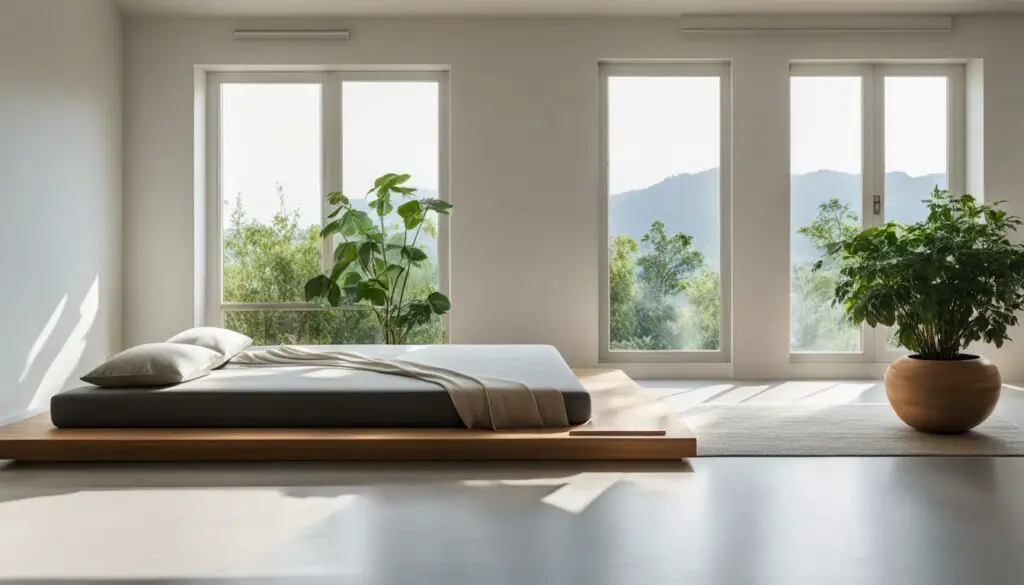
By practicing mindfulness and embracing the Zen philosophy, you can achieve inner balance and live a more fulfilling life. Incorporate these practices into your daily routine and see how they can benefit your overall well-being.
Enhancing Relationships with Feng Shui
Feng Shui is not just about creating a visually appealing space, it’s also about improving relationships and promoting positive interactions. Here are some tips to help you apply Feng Shui principles to enhance your relationships:
| Tip | Description |
|---|---|
| Clear the Clutter | A cluttered space can cause stress and tension in relationships. Clear out any unnecessary items and keep your space organized and clutter-free. |
| Use Pairs | Pair objects together, such as matching nightstands, to create balance and harmony in your space. This can also symbolize a partnership or relationship. |
| Incorporate Red | In Feng Shui, red is believed to promote love and passion. Use accents of red in your decor, such as throw pillows or a piece of artwork, to enhance your relationships. |
| Create a Welcoming Entryway | Make sure your entryway is well-lit and inviting. Consider adding a small table or bench to create a welcoming space for guests. |
| Position Your Bed Correctly | Your bed should be positioned in a way that allows for equal access and space on both sides. This promotes equality and balance in your relationship. |

By incorporating these tips into your space, you can create a more harmonious and positive environment for your relationships to thrive.
Creating Serene Spaces with Zen Interior Design
Zen interior design is a philosophy that focuses on creating peaceful and tranquil living spaces. By incorporating elements of nature, simplicity, and balance, this approach to home décor promotes relaxation and a sense of calm.
One key aspect of Zen interior design is the use of natural materials. Wood, bamboo, stone, and other natural elements can be used to create a sense of harmony with the environment. Furniture made from these materials can also add a touch of elegance and sophistication, while still maintaining the sense of simplicity that defines Zen philosophy.
Another important element of Zen interior design is minimalism. This means keeping clutter to a minimum and only displaying items that are essential or have personal meaning. This approach can create a more spacious and airy feel to a living space, which can help to promote relaxation and peace of mind.
Color is also important in Zen interior design. Neutral tones, such as beige, white, and pale gray, are often used to create a calming and restful environment. Lighter shades of blue and green can also be used to evoke a sense of tranquility and harmony.
Incorporating natural light is another hallmark of Zen interior design. This can be achieved by using sheer curtains, installing skylights, or placing furniture to take advantage of natural light sources. Artificial lighting can also be used to create a warm and inviting ambiance.
Creating a home that reflects Zen principles can be a deeply rewarding experience. It allows us to connect with our surroundings and create a peaceful refuge from the stresses of daily life.
| Zen Interior Design | Feng Shui Decorating |
|---|---|
| Focuses on natural materials | Uses elements to create harmony and balance |
| Embraces minimalism | Keeps clutter to a minimum |
| Neutral tones and natural light | Uses color and lighting to balance energy |
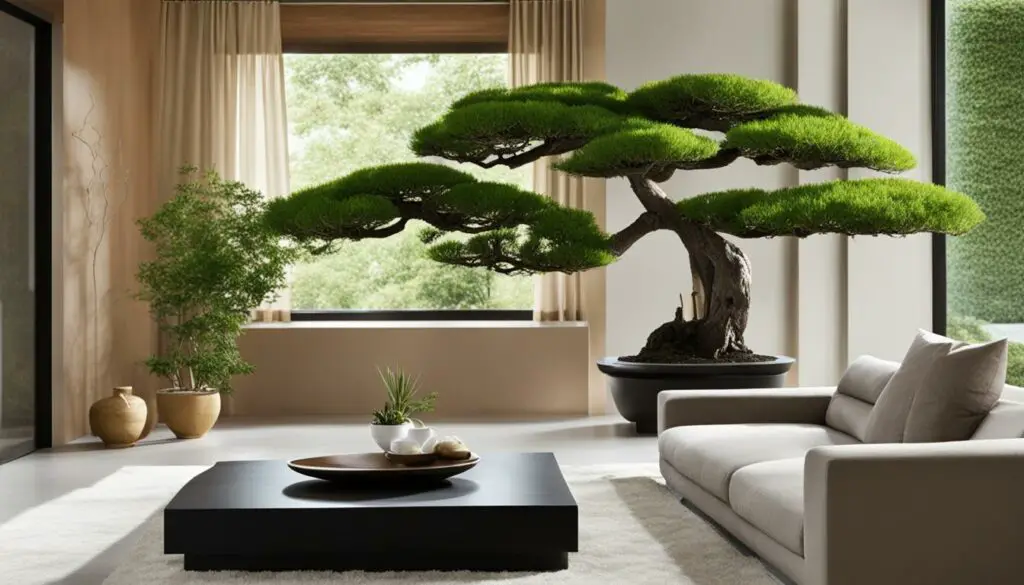
Key takeaways:
- Zen interior design is a philosophy focused on creating peaceful and tranquil living spaces.
- Natural materials, minimalism, and neutral colors are key elements of this style.
- Incorporating natural light and creating a clutter-free space are also important to Zen interior design.
The Intersection of Feng Shui and Zen
Feng Shui and Zen, although distinct in their principles and practices, share interesting intersections. Both philosophies center around achieving harmony and balance in our lives.
While Feng Shui utilizes the arrangement of objects and space to promote positive energy flow, Zen focuses on cultivating mindfulness and inner peace through meditation and simplicity. However, both practices recognize the importance of creating a harmonious environment, whether for external or internal balance.
Some practitioners may find that combining elements of Feng Shui and Zen can enhance the effectiveness of both practices. For example, incorporating Zen meditation techniques along with Feng Shui principles can create a more dynamic approach to balancing energy flow in a space.
It is essential to note that while these practices may complement each other, they are distinct in their approaches. For those interested in exploring the intersection of Feng Shui and Zen, it is essential to understand the differences and nuances of each practice and determine their relevance to an individual’s lifestyle and preferences.
Key Differences
One significant difference between Feng Shui and Zen is their respective focuses. While Feng Shui concentrates on creating a harmonious environment through the arrangement of objects and colors, Zen emphasizes inner peace and mindfulness through meditation and simplicity.
Another difference is the role of nature. Feng Shui incorporates elements of nature, such as plants and water, to promote positive energy flow, while Zen emphasizes connecting with nature to cultivate a deep sense of inner peace.
Overall, while Feng Shui seeks to enhance external harmony, Zen’s focus is on internal balance. However, both practices recognize the importance of balancing energies in our lives to achieve overall well-being.
Key Similarities
One significant similarity between Feng Shui and Zen is their emphasis on creating a harmonious environment. Feng Shui seeks to balance energy by arranging space, colors, and elements, while Zen promotes peace and tranquility through the cultivation of mindfulness and simplicity.
Both practices recognize the importance of energy flow and the impact it has on our daily lives. Additionally, they both recognize the power of intention and mindfulness in achieving balance and harmony.
The Intersection in Practice
There are various ways to incorporate elements of both Feng Shui and Zen into daily life. For example, one can utilize Feng Shui principles in the arrangement of space while also incorporating Zen meditation techniques to cultivate inner peace.
Incorporating elements of nature, such as plants and water features, can create a harmonious environment while also connecting with nature and cultivating a sense of inner peace. Additionally, simplicity is a key element of both practices, as clutter and excess can disrupt energy flow and create disharmony.
Ultimately, the intersection of Feng Shui and Zen offers a unique and dynamic approach to achieving balance and harmony in our lives. By understanding the principles of both practices and tailoring them to our individual preferences and lifestyles, we can create a living space and a lifestyle that promotes tranquility, mindfulness, and overall well-being.
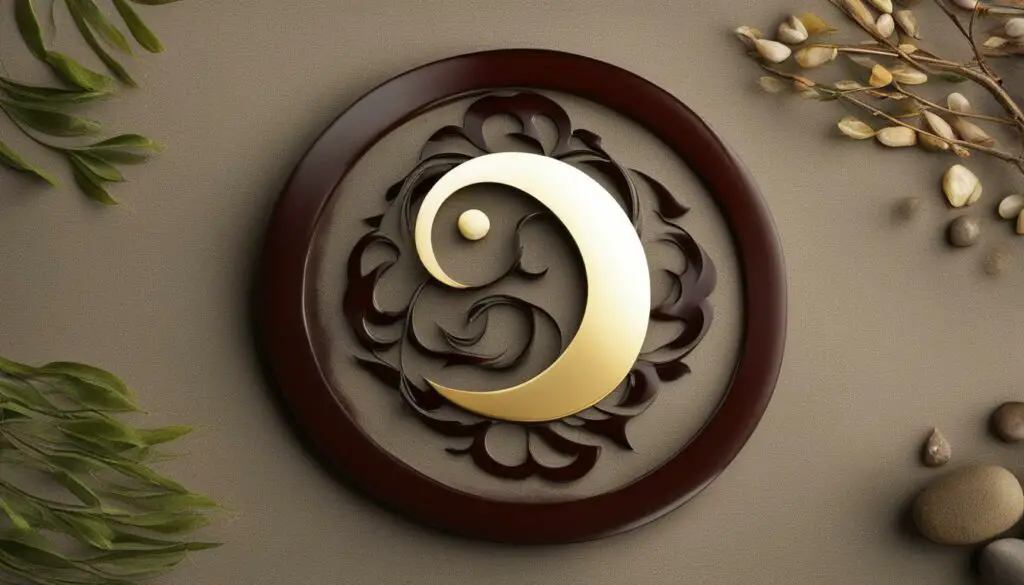
Incorporating Zen Elements into Feng Shui
When it comes to creating a harmonious living space, Feng Shui and Zen philosophy share many similarities. Both practices focus on promoting balance and positive energy flow, and both believe that our environment can influence our well-being.
One way to enhance the effectiveness of Feng Shui principles is to infuse Zen elements into your home decor. Zen philosophy emphasizes simplicity, mindfulness, and living in the present moment, all of which can contribute to a more harmonious living environment.
Here are some tips on how to incorporate Zen elements into your Feng Shui practice:
- Declutter: Clearing out unnecessary items can create a sense of spaciousness and calm in your home. Use the principles of Zen minimalism to guide your decluttering process, and only keep what you truly need or love.
- Nature-inspired decor: Incorporating natural elements such as plants, stones, or wood can add a soothing and grounding energy to your living space. Choose items that have a simple and organic feel, and arrange them in a way that feels balanced and harmonious.
- Mindful decor: Zen philosophy encourages us to be present and mindful in all aspects of our lives, including our home decor. Choose items that have meaning and significance to you, and arrange them in a way that feels intentional and purposeful.
- Neutral colors: Neutral colors such as white, beige, or soft gray can create a calming and serene atmosphere in your home. Use these colors as a base, and add pops of color with accents such as pillows or artwork.
- Natural light: Natural light is an essential element of both Feng Shui and Zen design. Make the most of natural light sources in your home, and avoid blocking windows with heavy curtains or furniture.
By incorporating these Zen elements into your Feng Shui practice, you can create a living space that promotes harmony, balance, and inner peace.

Finding Personal Alignment with Feng Shui and Zen
While Feng Shui and Zen may appear to be vastly different practices, there are areas where they intersect. By exploring both philosophies, individuals can find ways to create a harmonious living space and lifestyle that aligns with their personal preferences and beliefs.
The Differences
The key differences between Feng Shui and Zen are their origins and focus. Feng Shui originated in China and is focused on the arrangement of objects in a physical space to create a harmonious environment that promotes positive energy flow. Zen, on the other hand, originated in Japan and emphasizes mindfulness, meditation, and living in the present moment as a means to achieve inner peace and tranquility.
Feng Shui places more emphasis on the physical space and the objects within it, while Zen focuses on the inner state of being. Feng Shui seeks to create balance and harmony through the arrangement of objects, colors, and elements, while Zen encourages individuals to cultivate inner balance and peace of mind through mindfulness and meditation.
The Intersection
Despite their differences, Feng Shui and Zen share a common goal of creating harmony and balance in our lives. Both practices prioritize simplicity and encourage individuals to live in a way that is aligned with their personal values and beliefs.
One way to integrate the principles of Feng Shui and Zen is to apply mindfulness to the arrangement of objects in a physical space. By being intentional and present while arranging objects, individuals can create a harmonious environment that promotes positive energy flow and inner peace. Similarly, incorporating elements of nature and simplicity in home decor can enhance the effectiveness of Feng Shui principles in promoting balance and harmony.
Incorporating Zen elements into the practice of Feng Shui can also lead to a more holistic approach to creating a harmonious living space and lifestyle. By infusing the principles of mindfulness and meditation into the arrangement of objects and colors, individuals can create a living space that promotes both inner and outer harmony.
Conclusion
While there are distinct differences between Feng Shui and Zen, there are also areas where they intersect. By exploring these philosophies, individuals can find personal alignment with practices that promote harmony, balance, and inner peace.
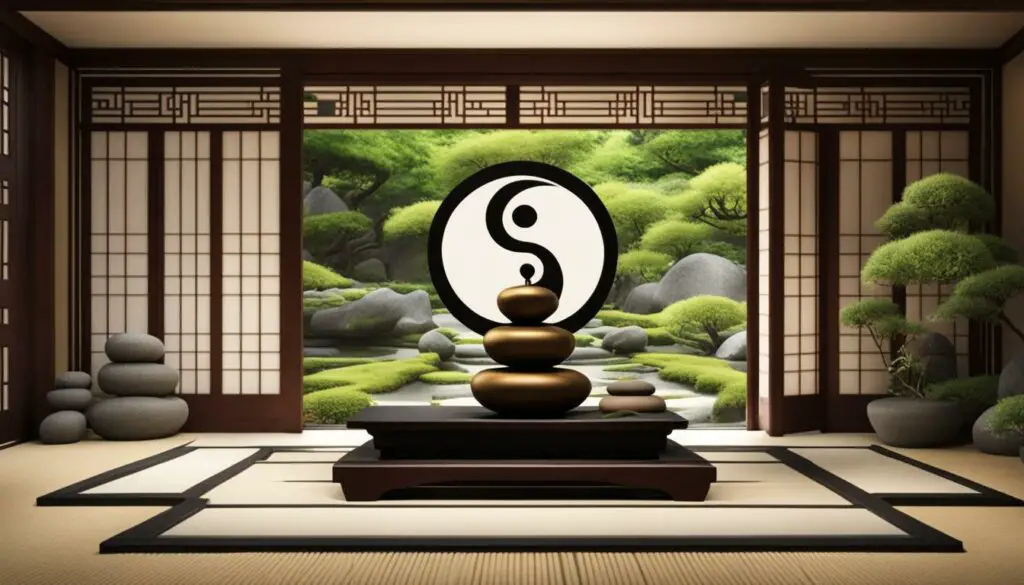
Balancing Your Life: Feng Shui vs Zen
As we have explored in this article, both Feng Shui and Zen offer unique perspectives on finding balance and harmony in our lives. While they share some common principles, there are also significant differences between these two practices.
Feng Shui focuses primarily on creating harmony through the arrangement of physical objects and the flow of energy in our living spaces. On the other hand, Zen philosophy emphasizes mindfulness, simplicity, and living in the present moment as a means to find inner peace and balance.
| Feng Shui | Zen |
|---|---|
| Physical objects and their arrangement | Mindfulness and simplicity |
| Creates harmony through energy flow | Focuses on finding inner peace and tranquility |
| Has roots in ancient Chinese culture | Originated in Japan as a form of Buddhism |
Ultimately, the choice between Feng Shui and Zen as a means of finding balance in your life is a personal one. It may be helpful to try out elements of both practices and see what resonates with you.
Perhaps you find that the physical aspects of Feng Shui, such as arranging furniture and incorporating specific colors, bring a sense of calm and balance to your living space. Or maybe you find that the mindfulness and meditation practices of Zen philosophy allow you to connect more deeply with your inner self and find peace in the present moment.
Whichever path you choose, the key is to find practices that work for you and align with your values and lifestyle. By incorporating elements of Feng Shui and Zen into your daily routine and living space, you can create a more balanced and harmonious life both externally and internally.

Conclusion
By exploring the fascinating worlds of Feng Shui and Zen, we hope you have gained a deeper understanding of how these practices can enhance your lifestyle. While Feng Shui principles guide the arrangement of objects, colors, and elements to promote positive energy flow and harmony, Zen philosophy embraces simplicity, mindfulness, and living in the present moment as a means to achieve inner peace and tranquility.
By incorporating both practices, you can create a living space and a lifestyle that promote mindfulness, balance, and overall well-being. With Feng Shui decorating, you can arrange furniture, incorporate colors, and utilize elements to create a harmonious environment that promotes positive interactions and communication.
With Zen meditation, you can cultivate mindfulness, focus, and inner balance. Infusing Zen elements into the practice of Feng Shui can enhance the effectiveness of Feng Shui principles in promoting harmony and balance. By finding personal alignment with these practices, you can tailor them to suit your individual preferences and lifestyle.
We hope this article has provided you with valuable insights on the differences and similarities between Feng Shui and Zen. By balancing your life with these practices, you can achieve a harmonious and fulfilling life, both externally and internally.
FAQ
What is the difference between Feng Shui and Zen?
Feng Shui is a practice focused on arranging objects and colors in a space to promote positive energy flow, while Zen is a philosophy that emphasizes simplicity, mindfulness, and living in the present moment for inner peace.
What are the foundational principles of Feng Shui?
The foundational principles of Feng Shui guide the arrangement of objects, colors, and elements in a space to promote harmony, balance, and positive energy flow.
What are the core principles of Zen philosophy?
The core principles of Zen philosophy include simplicity, mindfulness, and living in the present moment as a means to achieve inner peace and tranquility in daily life.
How can I incorporate Feng Shui in my home decor?
To incorporate Feng Shui in your home decor, you can arrange furniture, incorporate specific colors, and utilize elements that promote harmony and balance in your living environment.
What is Zen meditation and how can it benefit me?
Zen meditation is a practice that cultivates mindfulness, focus, and inner balance. It can benefit you by helping you achieve a sense of calm, reduce stress, and enhance overall well-being.
How does the specific arrangement of objects in Feng Shui affect energy flow?
The specific arrangement of objects in Feng Shui can either enhance or hinder the flow of energy in a space. By carefully placing objects and furniture, you can optimize the energy flow and create a harmonious atmosphere.
How can I incorporate mindfulness into my daily routine?
To incorporate mindfulness into your daily routine, you can practice activities such as meditation, deep breathing exercises, and staying present in the current moment.
Can Feng Shui principles be applied to enhance relationships?
Yes, Feng Shui principles can be applied to enhance relationships. By creating a harmonious environment that promotes positive energy flow, communication, and interaction, relationships can be positively influenced.
How can I create serene spaces with Zen interior design?
To create serene spaces with Zen interior design, you can incorporate elements of nature, simplicity, minimalism, and a soothing color palette to promote relaxation and peace.
How do Feng Shui and Zen intersect?
Feng Shui and Zen intersect in their focus on creating harmony, balance, and positive energy flow. While Feng Shui emphasizes the arrangement of objects, colors, and elements, Zen promotes mindfulness, simplicity, and living in the present moment.
How can Zen elements be integrated into Feng Shui?
Zen elements can be integrated into Feng Shui by infusing mindfulness and simplicity into the practice. By incorporating Zen principles, the effectiveness of Feng Shui in promoting harmony and balance can be enhanced.
How can I find personal alignment with Feng Shui and Zen?
To find personal alignment with Feng Shui and Zen, it is important to understand the distinct approaches of both practices and tailor them to suit your individual preferences and lifestyle.
What are the key differences and similarities between Feng Shui and Zen?
The key differences between Feng Shui and Zen lie in their focus and approach. Feng Shui emphasizes the arrangement of objects and colors for positive energy flow, while Zen promotes simplicity, mindfulness, and living in the present moment. However, both practices aim to create harmony, balance, and inner peace.
